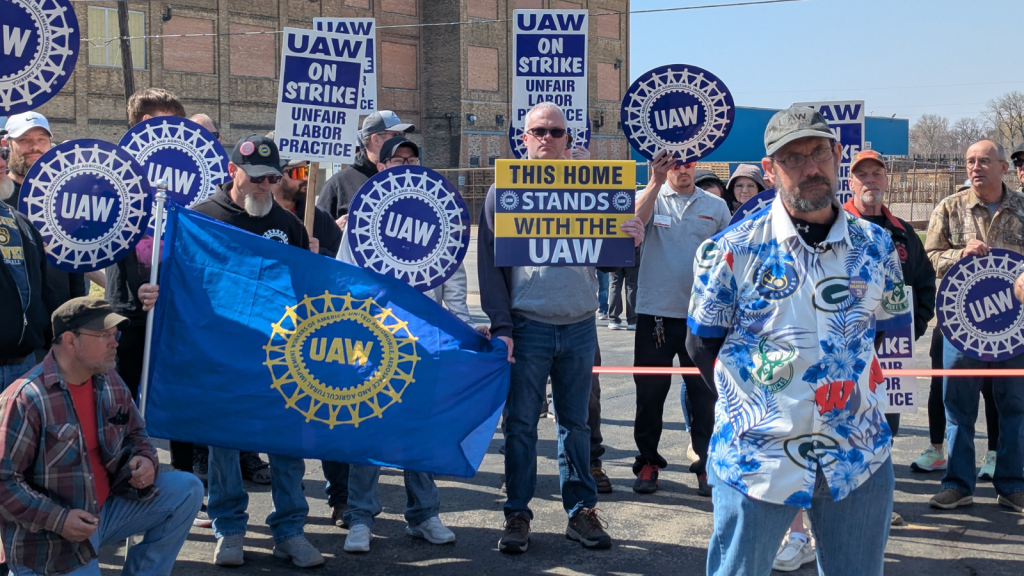
Source: SEIU Wisconsin
OSHKOSH, Wis. (WISS) – When a union goes on strike, workers are left relying on their savings, side jobs, or family members for support and meeting the basic day-to-day living expenses. That’s where a union’s “strike fund” comes into play.
What is a Strike Fund
A strike fund is a financial reserve established by a union to provide financial support, or “strike pay,” to its members who are on strike. Members’ dues finance the funds, which are a crucial resource to workers who lose their income while on strike.

In the United States, strike pay is generally considered taxable income.
Each union is different. The amount of strike pay and the requirements to receive it are spelled out in each union’s bylaws.
For example, the United Auto Workers union will provide $500 per week or $100 a day for members on strike. The UAW Strike and Defense Fund also covers benefits like medical and prescription drugs.
Striking Teamsters get paid weekly. Their website states that strike benefits use a formula based on monthly dues, but the minimum is $200 per week. According to their constitution, the Teamsters must maintain a minimum of $150,000,000 in their strike fund at all times. The union currently has over $300 million in its strike fund.
The AFL-CIO has several different relief funds to help support and protect workers.
Strike Funds in action
Teamsters
According to Tom Strickland, secretary-treasurer of Teamsters Local 662 in Green Bay, a robust strike fund sends a message to employers.
“It sends a strong message to employers that should you not do the right by your employees, we have financial support behind us,” Strickland said.
In recent years, the Teamsters have gone on strike at New Dairy Select Milk and at Leinenkugel’s. Strickland said the strike fund kept the union workers flush during a tough time.
“Those folks were on the picket line for eight weeks because there was a strike fund,” Strickland said. “In addition, the union insurance. It’s not just the strike fund. Our health people stepped up to provide healthcare coverage while our members are striking. So it’s not just our strike fund, it’s also our union health benefits.”
UAW
When UAW Local 291 in Oshkosh was on strike at Cummins this year, additional support for the striking workers of UAW Local 291 also came from area legislators. Students at UW-Oshkosh donated food to the effort.
But, UAW Local 291 president Ryan Compton said the strike fund was able to keep workers afloat during their three-and-a-half-month strike. The workers received $500 a week and had healthcare coverage from the union.
”It is tremendously important. It’s really hard to keep members out if they are not receiving money. And especially nowadays with how much everything costs for prescriptions and such like that. Tremendously important,” Compton said.

Compton added that strike funds are not just financial support but also provide an emotional boost to striking workers.
”You know, it’s a big morale booster when man, when you’re out for 14 weeks or whatever it was. Of course, you know it’s a demand on you financially,” Compton said. “But at least, man, it helps a lot to keep on fighting.”
2025 Strikes in Wisconsin
Two significant strikes are currently underway in Wisconsin.
Members of UAW Local 95 in Janesville began striking at Mercyhealth East Clinic in July. The workers are demanding better pay, improvements to working conditions, and affordable healthcare. That strike enters its third month today. The union is planning a rally in Madison sometime in September.
In Monroe, a large group of workers from W&W Dairy is striking. However, they are not union members. About half of the cheesemaker’s employees walked out in early August after the Kansas-based Dairy Farmers of America cooperative took over operations at W&W. During the transition, the company started using E-Verify. This federal online system checks an employee’s immigration status and other official information. The workers called that a slap in the face to employees who have been with the cheesemaker for decades. A union does NOT represent these workers, and they do not have the protections of a strike fund.
Earlier this year, SEIU Wisconsin nurses at Meriter Hospital in Madison picketed for five days.

Lisa Hale is Northeast Wisconsin Bureau Chief and the voice of newscasts on WISS. Email her at lisa.hale@civicmedia.us.
Want More Local News?
Civic Media
Civic Media Inc.
The Civic Media App
Put us in your pocket.
